Erickwhite
On this page, you find all documents, package deals, and flashcards offered by seller ERICKWHITE.
- 148
- 0
- 0
Community
- Followers
- Following
1 Reviews received
148 items
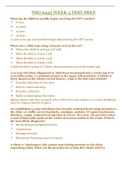
NSG 6435 WEEK 3 TEST PREP
What age do children usually begin receiving the HPV vaccine? 8 years 11 years 13 years 15 years 11 years is the age most providers begin administering the HPV vaccine. When can a child stop using a booster seat in the car? When the child is at least 4’9” tall. When the child is at least 5’ tall. When the child is at least 4’ tall. When the child is at least 3’ tall. A child should be at least 4’9” before discontinuing the use of the booster ...
- Exam (elaborations)
- • 3 pages •
What age do children usually begin receiving the HPV vaccine? 8 years 11 years 13 years 15 years 11 years is the age most providers begin administering the HPV vaccine. When can a child stop using a booster seat in the car? When the child is at least 4’9” tall. When the child is at least 5’ tall. When the child is at least 4’ tall. When the child is at least 3’ tall. A child should be at least 4’9” before discontinuing the use of the booster ...
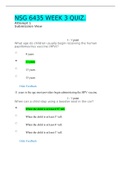
NSG 6435 WEEK 3 QUIZ.
Attempt 1 Submission View Week 3 Quiz Question 1 1 / 1 point What age do children usually begin receiving the human papillomavirus vaccine (HPV)? 8 years 11 years 13 years 15 years Hide Feedback 11 years is the age most providers begin administering the HPV vaccine. Question 2 1 / 1 point When can a child stop using a booster seat in the car? When the child is at least 4’9” tall. When the child is at least 5’ tall. When the child is at least 4’ tall...
- Exam (elaborations)
- • 7 pages •
Attempt 1 Submission View Week 3 Quiz Question 1 1 / 1 point What age do children usually begin receiving the human papillomavirus vaccine (HPV)? 8 years 11 years 13 years 15 years Hide Feedback 11 years is the age most providers begin administering the HPV vaccine. Question 2 1 / 1 point When can a child stop using a booster seat in the car? When the child is at least 4’9” tall. When the child is at least 5’ tall. When the child is at least 4’ tall...
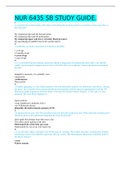
NUR 6435 SB STUDY GUIDE.
1. A congenital heart abnormality often discovered during the newborn period is coarctation of the aorta. How is this assessed? By comparing right and left femoral pulses By comparing right and left pedal pulses By comparing upper and lower extremity blood pressures By auscultating an audible bruit in the carotid arteries 2. A child who can stack a maximum of 5 blocks is probably: 1 yr of age 15 months of age 2 years of age 3 years of age 3. A 6 yr old child who has moderate persi...
- Exam (elaborations)
- • 29 pages •
1. A congenital heart abnormality often discovered during the newborn period is coarctation of the aorta. How is this assessed? By comparing right and left femoral pulses By comparing right and left pedal pulses By comparing upper and lower extremity blood pressures By auscultating an audible bruit in the carotid arteries 2. A child who can stack a maximum of 5 blocks is probably: 1 yr of age 15 months of age 2 years of age 3 years of age 3. A 6 yr old child who has moderate persi...
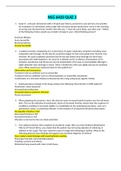
NSG 6420 QUIZ 3
1. Susan P., a 60-year-old woman with a 30 pack year history, presents to your primary care practice for evaluation of a persistent, daily cough with increased sputum production, worse in the morning, occurring over the past three months. She tells you, “I have the same thing, year after year.” Which of the following choices would you consider strongly in your critical thinking process? Seasonal allergies Acute bronchitis Bronchial asthma Chronic bronchitis 2. A patient presents co...
- Exam (elaborations)
- • 4 pages •
1. Susan P., a 60-year-old woman with a 30 pack year history, presents to your primary care practice for evaluation of a persistent, daily cough with increased sputum production, worse in the morning, occurring over the past three months. She tells you, “I have the same thing, year after year.” Which of the following choices would you consider strongly in your critical thinking process? Seasonal allergies Acute bronchitis Bronchial asthma Chronic bronchitis 2. A patient presents co...
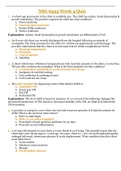
NSG 6435 Week 4 Quiz
1. A school-age pt presents to the clinic to establish care. The child has autism, facial dysmorphia & growth retardation. The provider suspects the child has what condition? a. Down syndrome b. Fetal alcohol syndrome c. Prader-Willis syndrome d. Turner syndrome Explanation: Autism, facial dysmorphia & growth retardation are differentials of FAS. 2. An 8-year-old client was recently discharged from the hospital following an episode of meningitis. The client presented to the clinic for ...
- Exam (elaborations)
- • 2 pages •
1. A school-age pt presents to the clinic to establish care. The child has autism, facial dysmorphia & growth retardation. The provider suspects the child has what condition? a. Down syndrome b. Fetal alcohol syndrome c. Prader-Willis syndrome d. Turner syndrome Explanation: Autism, facial dysmorphia & growth retardation are differentials of FAS. 2. An 8-year-old client was recently discharged from the hospital following an episode of meningitis. The client presented to the clinic for ...
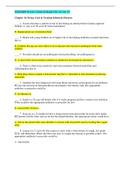
NSG6005 Week 3 Quiz Q Bank Ch: 24, 26, 37
Chapter 24: Drugs Used in Treating Infectious Diseases ____ 1. Factors that place a patient at risk of developing an antimicrobial resistant organism include: A. Age over 50 years B. School attendance D. Inappropriate use of antimicrobials ____ 2. Infants and young children are at higher risk of developing antibiotic-resistant infections due to: B. Children this age are more likely to be in daycare and exposed to pathogens from other children ____ 3. Providers should use an antibiogram w...
- Exam (elaborations)
- • 6 pages •
Chapter 24: Drugs Used in Treating Infectious Diseases ____ 1. Factors that place a patient at risk of developing an antimicrobial resistant organism include: A. Age over 50 years B. School attendance D. Inappropriate use of antimicrobials ____ 2. Infants and young children are at higher risk of developing antibiotic-resistant infections due to: B. Children this age are more likely to be in daycare and exposed to pathogens from other children ____ 3. Providers should use an antibiogram w...
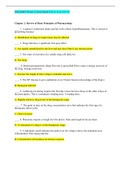
NSG6005 Week 2 Quiz Bank Ch: 2, 5, 6, 10, 13
Chapter 2: Review of Basic Principles of Pharmacology ____ 1. A patient’s nutritional intake and lab work reflects hypoalbuminemia. This is critical to prescribing because: A. Distribution of drugs to target tissue may be affected ____ 2. Drugs that have a significant first-pass effect: C. Are rapidly metabolized by the liver and may have little if any desired action ____ 3. The route of excretion of a volatile drug will likely be: B. The lungs ____ 4. Medroxyprogesterone (Depo P...
- Exam (elaborations)
- • 12 pages •
Chapter 2: Review of Basic Principles of Pharmacology ____ 1. A patient’s nutritional intake and lab work reflects hypoalbuminemia. This is critical to prescribing because: A. Distribution of drugs to target tissue may be affected ____ 2. Drugs that have a significant first-pass effect: C. Are rapidly metabolized by the liver and may have little if any desired action ____ 3. The route of excretion of a volatile drug will likely be: B. The lungs ____ 4. Medroxyprogesterone (Depo P...
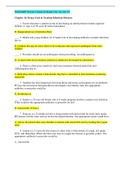
NSG 6006 FORMATIVE EXAM
General Document Guidelines Page numbers are cross-referenced with the APA Publication Manual , 6 th ed. If using another APA 6 th ed. reference source, search for topic in table of contents or index. Margins p. 229 1 ” at the top, bottom, left, and right of every page Spacing p. 229 Double space entire paper—no extra spaces (exception: a heading by itself at the bottom of a page—move heading to next page) Alignment p. 229 Flush left (not justified--right margin should be uneve...
- Exam (elaborations)
- • 6 pages •
General Document Guidelines Page numbers are cross-referenced with the APA Publication Manual , 6 th ed. If using another APA 6 th ed. reference source, search for topic in table of contents or index. Margins p. 229 1 ” at the top, bottom, left, and right of every page Spacing p. 229 Double space entire paper—no extra spaces (exception: a heading by itself at the bottom of a page—move heading to next page) Alignment p. 229 Flush left (not justified--right margin should be uneve...
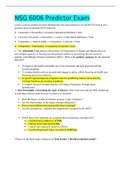
NSG 6006 Predictor Exam
.Once a practice problem has been identified the next step would be to use the PICOT format to ask a question about the problem PICOT stands for O P population I intervention C concepts O operational definitions T time O P precision instrument , I intervention , C control , O Operational definitions , T time O P Population , I internal validity , c comparisons , o outcome , T time O P Population , I Intervention , C Comparison O Outcome T time 2. The Affordable Care Act...
- Exam (elaborations)
- • 28 pages •
.Once a practice problem has been identified the next step would be to use the PICOT format to ask a question about the problem PICOT stands for O P population I intervention C concepts O operational definitions T time O P precision instrument , I intervention , C control , O Operational definitions , T time O P Population , I internal validity , c comparisons , o outcome , T time O P Population , I Intervention , C Comparison O Outcome T time 2. The Affordable Care Act...
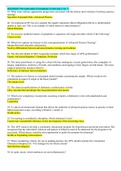
NSG6006 Pre-specialty Evaluation Exam pg 5 to 7.
. What terms indicate appropriate progression associated with the history and evolution of advance practice nursing? Specialist, Expanded Role, Advanced Practice 46. An experienced NP, has two separate but equally important ethical obligations that he is unfortunately unable to carry out. This is an example of which barrier to ethical practice? Moral Dilemma 47. Pre-invasive epithelial tumors of glandular or squamous cell origin describes which of the following? Cancer in situ 48....
- Exam (elaborations)
- • 3 pages •
. What terms indicate appropriate progression associated with the history and evolution of advance practice nursing? Specialist, Expanded Role, Advanced Practice 46. An experienced NP, has two separate but equally important ethical obligations that he is unfortunately unable to carry out. This is an example of which barrier to ethical practice? Moral Dilemma 47. Pre-invasive epithelial tumors of glandular or squamous cell origin describes which of the following? Cancer in situ 48....

NSG 6020 WEEK 1 Quiz